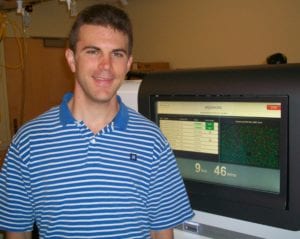Media Contact:
Nalini Padmanabhan
ASHG Communications Manager
301.634.7346
press@ashg.org
For Immediate Release
Saturday, October 18, 2014
6:00 pm U.S. Pacific Time (UTC-05:00)
Findings Reported at ASHG 2014 Annual Meeting

BETHESDA, MD – Human geneticists have discovered that a region of the genome associated with autism contains genetic variation that evolved in the last 250,000 years, after the divergence of humans from ancient hominids, and likely plays an important role in disease. Their findings were presented today at the American Society of Human Genetics (ASHG) 2014 Annual Meeting in San Diego.
Researchers at the University of Washington analyzed the genomes of 2,551 humans, 86 apes, one Neanderthal, and one Denisovan. They closely examined a region of human chromosome 16 known as 16p11.2, a region prone to genetic changes in which segments of DNA are deleted or duplicated, one of the most common genetic causes of autism, schizophrenia, and other conditions. The geneticists found that certain segments of DNA in this region are repeated a variable number of times in different people and may also be associated with disease.
To trace the origins of this variation, the researchers collaborated with colleagues at the University of Lausanne and the University of Bari to sequence and analyze corresponding regions of ape genomes.
“When we compared the genomes of apes and humans, we found that the humans had evolved complex structural changes at 16p11.2 associated with deletions and duplications that often result in autism. The findings suggest that these changes emerged relatively recently and are unique to humans,” explained study author Xander Nuttle, BS, BSE, a graduate student in the Department of Genome Sciences at the University of Washington School of Medicine.
While this genetic variation has likely made humans more vulnerable to disease, the scientists believe it also contributed to the formation of novel genes. One such gene is BOLA2, a gene thought to be important in cell reproduction. The researchers found that while apes, Neanderthals, and Denisovans had only two copies of BOLA2, all modern humans have between three and 14 copies, with an average of six. The team is currently studying the function of BOLA2 to understand the potential significance of additional copies for human evolution.
“Another question we are exploring is why people with the same duplications and deletions at 16p11.2 vary in disease severity,” Mr. Nuttle said. “Some people are healthy or have mild illness, while others are severely affected and have multiple clinical diagnoses.”
One hypothesis is that differences among people in how the region is organized, such as the number of copies of genes like BOLA2 present and the precise locations at which deletions and duplications start and end, contribute to this variability. To examine this possibility, Mr. Nuttle and colleagues are analyzing DNA and medical data from over 125 individuals with deletions or duplications at 16p11.2.
“We believe this work will lead to new insights about the genetic underpinnings of autism and other conditions associated with 16p11.2 deletions and duplications, potentially paving the way for more specific diagnostics and treatments for patients in the future,” Mr. Nuttle said.
Press Availability: Mr. Nuttle will be available to discuss this research with interested media on Sunday, October 19, 2014, from 12:15-1:15 p.m., in the ASHG 2014 Press Office (Room 22).
Reference: Nuttle X et al. (2014 Oct 18). Abstract: Human-specific gene evolution and structural diversity of the chromosome 16p11.2 autism CNV. Presented at American Society of Human Genetics 2014 Annual Meeting. San Diego, Calif.
About the American Society of Human Genetics (ASHG)
Founded in 1948, the American Society of Human Genetics is the primary professional membership organization for human genetics specialists worldwide. Its nearly 8,000 members include researchers, academicians, clinicians, laboratory practice professionals, genetic counselors, nurses, and others with an interest in human genetics. The Society serves scientists, health professionals, and the public by providing forums to: (1) share research results through the ASHG Annual Meeting and in The American Journal of Human Genetics; (2) advance genetic research by advocating for research support; (3) educate current and future genetics professionals, health care providers, advocates, policymakers, educators, students, and the public about all aspects of human genetics; and (4) promote genetic services and support responsible social and scientific policies. For more information, visit: http://www.ashg.org.
9650 Rockville Pike | Bethesda, MD 20814 | 301.634.7300 | society@ashg.org | www.ashg.org
Connect with ASHG on Twitter (@GeneticsSociety) | Facebook | LinkedIn
